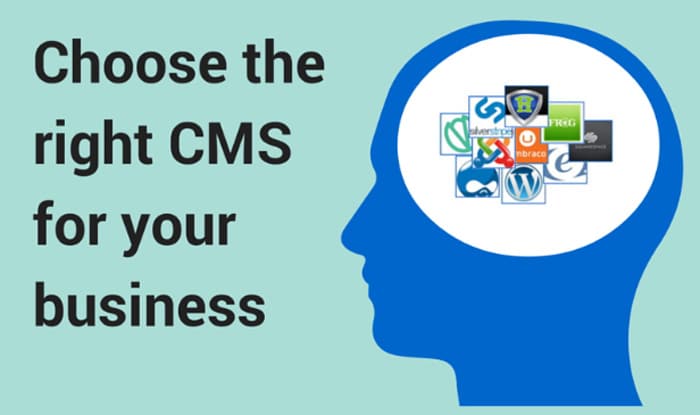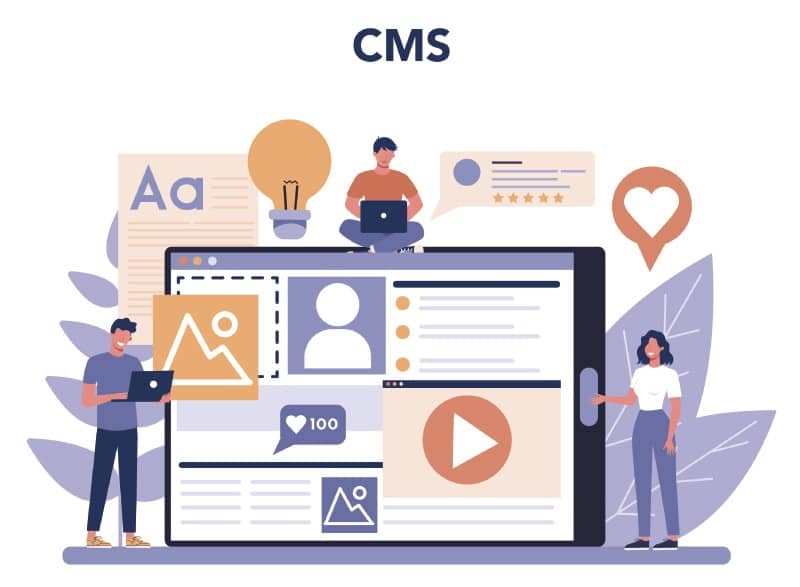In today’s digital era, the significance of maintaining a strong online presence cannot be overstated for businesses regardless of their size. This era is characterized by rapid technological advancements and an increasingly digital-centric consumer base. Most consumers now rely heavily on online platforms to make their purchasing decisions, gather information, and engage with brands. Thus, for a business to thrive, or even to simply remain competitive, it’s essential to have a robust online presence. This means not just having a website, but ensuring that the website is engaging, user-friendly, and effectively represents the business and its values.
Selecting the best CMS for website plays a crucial role in this context. A CMS is the foundation on which a website is built and managed. It’s a tool that enables you to create, edit, and manage your website content without needing extensive technical know-how. The right CMS can empower your business to maintain a dynamic and effective online presence with ease. It can significantly influence factors such as how well your website ranks on search engines, how easily users can navigate your site, and how effectively you can update and manage your digital content.
To assist in this critical decision-making process, a comprehensive guide that simplifies CMS selection can be invaluable. Such a guide explores various aspects of CMS selection, offering insights and information that cater to the diverse needs of different businesses. It aims to demystify the process and provide clear, actionable advice, making it easier for businesses to choose a CMS that aligns with their digital strategy, enhances their online presence, and supports their overall business goals. This guide is designed to help you navigate through the complexities of choosing the most appropriate CMS, ensuring that the decision you make contributes positively to your business’s online journey.
Understanding the importance of a good Content Management System (CMS) and selecting the right one for your website is a critical process that can significantly impact the success of your online presence. Let’s explore this in detail:
Understanding the Importance of a Best CMS for Website
A CMS is essentially the foundation of your website. It’s a platform that helps you create, manage, and modify content on your website without needing to have deep coding knowledge. The choice of CMS influences several crucial aspects of your website:
User Experience (UX): A good CMS ensures that visitors to your website have a positive experience. This includes how easily they can navigate your site and find the information they need.
Search Engine Optimization (SEO): The CMS you choose can affect your website’s ranking on search engines. A CMS that is optimized for SEO can greatly enhance your site’s visibility and organic traffic.
Business Needs: The best CMS for website should be aligned with your specific business requirements, offering the right balance between features and simplicity.
Key Features to Look For
When selecting a CMS, several key features are essential:
User-friendly Interface: The CMS should be easy to use, even for those without technical expertise. This makes managing your website more efficient.
Customization Capabilities: The ability to customize your website according to your brand and needs is vital. A good CMS should offer a range of customization options.
SEO-friendly Structure: Features that support SEO efforts, such as easy URL management and the ability to add and edit meta tags, are important.
Scalability: As your business grows, your CMS should be able to scale with you, handling increased traffic and content without performance issues.
The Role of CMS in SEO
A CMS that supports SEO strategies can be a game-changer for your online visibility:
Meta Tag Customization: The ability to easily customize meta titles and descriptions can significantly impact your search engine rankings.
Fast Loading Times: A CMS that facilitates fast page loading can reduce bounce rates and improve user experience, which are important SEO factors.
Mobile Responsiveness: With the increasing use of mobile devices, a CMS that ensures your website is mobile-friendly is crucial.
Security Aspects
In an era of increasing cyber threats, choosing a CMS with robust security features is essential to protect your site from attacks and data breaches.

Popular CMS Options for Different Business Needs
Depending on the nature and size of your business, different CMS platforms may be more suitable:
CMS for Small Business:
For smaller businesses, user-friendly and cost-effective CMS platforms like WordPress and Joomla are popular as they are easy to set up and manage.
WordPress: Dominating the market with its versatility, WordPress is an excellent choice for a wide range of websites, from small business sites to complex portals and blogs. Its extensive plugin ecosystem and theme options make it highly customizable.
Joomla: Known for its strong community support and flexibility, Joomla is a great choice for businesses needing a bit more than what WordPress offers in terms of complexity and customization.
Wix: With its intuitive drag-and-drop interface, Wix is a great option for small businesses or individuals looking to create professional-looking websites without extensive technical know-how.
CMS for Ecommerce:
Ecommerce sites require specific features like inventory management and secure payment processing. Platforms like Shopify and Magento are tailored for these needs.
Shopify: Ideal for ecommerce ventures, Shopify offers a comprehensive set of tools for online stores, including inventory management, payment processing, and a user-friendly interface.
Magento: A powerhouse for ecommerce solutions, Magento offers extensive features for large-scale online stores, including advanced customization, scalability, and a wide array of extensions.
Custom CMS Website:
Larger or more specialized businesses might require custom CMS solutions. These are tailored to specific business needs but can be more expensive and complex to manage.
Making the Right Choice for Your Business
Finally, when choosing a CMS, consider the following:
Business Size and Scope: The CMS should be appropriate for the scale and nature of your business – what works for a small blog may not suit a large ecommerce site.
User Experience and Design Flexibility: It’s crucial to choose a CMS that allows you to create a site that is both aesthetically pleasing and easy to navigate.
Budget and Resource Constraints: Factor in your budget and the resources you have available for managing your website. Some CMS platforms may have higher upfront costs but offer more functionality and scalability.

Conclusion
Choosing the best CMS for website is a critical decision that can shape your online presence. Whether you opt for a CMS for small business, a CMS for ecommerce, or a custom CMS website, the key is to find a platform that aligns with your business goals, offers flexibility, and grows with your business. By considering the factors outlined in this guide, you can make an informed decision that paves the way for your digital success.
The Criticality of the Decision
Influence on Online Presence: The choice of a CMS has a profound impact on your online presence. It determines how your website looks, feels, operates, and how effectively it can be managed. Given that your website is often the first point of contact with customers, the right CMS can set the tone for their experience with your brand.
Long-term Implications: The decision is not just about immediate needs but also about long-term implications. A CMS that suits your business today should also be capable of adapting to future growth and changes in the digital landscape.
Aligning with Business Goals
Business-Specific Needs: Different businesses have varying requirements. A small blog may prioritize ease of use and simplicity, whereas an e-commerce site might need advanced features like inventory management or secure payment gateways.
Goal Alignment: The chosen CMS should align with your broader business objectives. For example, if your goal is to expand your online sales, your CMS should robustly support ecommerce functionalities.
Flexibility and Scalability
Adaptability: The digital world is dynamic. The best CMS for website should be flexible enough to adapt to changing trends, customer behaviors, and business strategies.
Scalability: As your business grows, your CMS should be able to scale accordingly. This means being able to handle increased traffic, more content, and additional functionalities without compromising performance.
Consideration of Various Factors
User Experience: Ensuring that the CMS offers a great user experience for both website visitors and those managing it is crucial. A cumbersome or confusing CMS can deter users and complicate content management.
SEO Capabilities: The CMS should have built-in SEO tools or be compatible with third-party SEO plugins to help improve your website’s visibility in search engine results.
Security: With cyber threats on the rise, a CMS with strong security measures is non-negotiable to protect both your data and that of your users.
Cost-Efficiency: Budget is always a consideration. Weighing the cost against the features and potential ROI is essential. A more expensive CMS might offer greater functionalities that could prove beneficial in the long run.
Paving the Way for Digital Success
Informed Decision: By considering all these factors, you can make an informed decision that goes beyond just the superficial aspects of a CMS. It’s about understanding how this tool will serve your business in its digital journey.
Foundation for Online Strategy: The right CMS acts as a foundation for your digital strategy. It supports your content marketing efforts, enhances user engagement, and contributes to the overall digital footprint of your business.
In summary, the conclusion emphasizes that choosing the best CMS for website is more than just a technical decision; it’s a strategic one that affects every aspect of your online presence. By carefully considering your specific needs, goals, and the factors outlined, you can select a CMS that not only meets your current requirements but also supports and grows with your business over time, ultimately contributing to your digital success.
What Makes WordPress the Most Popular CMS for Websites?
WordPress is renowned for its ease of use, flexibility, and extensive customization options, making it a top choice for a variety of websites. Its user-friendly interface is ideal for beginners, while its powerful features and plugins cater to the needs of advanced users and developers. With a vast library of themes and plugins, WordPress allows for extensive customization, enabling businesses to tailor their sites to their specific needs. Additionally, its strong SEO capabilities and a large supportive community make it an all-around excellent choice for businesses looking to establish a robust online presence.
How important is selecting the right CMS for an ecommerce website?
Choosing the right CMS is crucial for ecommerce success as it directly impacts the functionality, user experience, and scalability of an online store. A good ecommerce CMS, like Shopify or Magento, offers specialized features such as secure payment processing, inventory management, and an intuitive shopping interface. It also ensures that the website can handle high traffic volumes and grow with your business. The right CMS makes managing an online store more efficient and can significantly enhance the customer’s shopping experience, leading to increased sales and customer loyalty.


